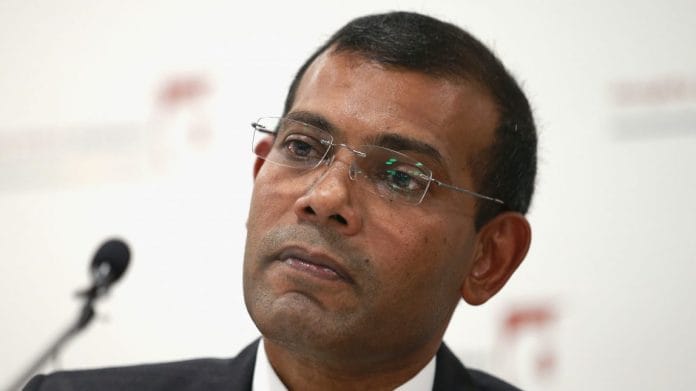New Delhi: Former president of Maldives Mohamed Nasheed has said his country will maintain friendly relations with every country, including China, even as it continues to follow the “India-first policy” that had come under severe strain in the last few years under the previous Maldivian regime.
“The government wants to have friendly relations with all countries, including China,” Nasheed told ThePrint in an email interview.
“India has been a consistent friend to Maldives, supporting us in our times of need, and always respecting our independence and sovereignty.”
The statement comes as Nasheed and President Ibrahim Solih’s Maldivian Democratic Party (MDP) won the country’s parliamentary polls with a massive mandate on 6 April, securing 65 seats in the 87-member People’s Majlis.
The parliamentary polls were held despite Solih’s victory over former president Abdulla Yameen just months earlier to bring some of the coalition leaders together who had drifted towards Yameen.
Also read: India relieved as President Solih’s party wins Maldives polls, but shadow of China remains
New stable government
“The situation is much more stable,” Nasheed told ThePrint.
“And I believe one of the things Maldivians voted for was a stable government that can implement its election manifesto. The president and I warned on the election campaign that if the opposition gained a majority in parliament, it would lead to another coup. Already they were starting to try and destabilise the government,” Nasheed said.
He added that just prior to the election, opposition MPs conspired and summoned two cabinet ministers to parliament for questioning, and a possible no-confidence motion.
“Opposition parties, and the Speaker, were also resorting to skulduggery to hold up reform and stop government bills from being voted on. I think Maldivians saw this, and voted en masse for the ruling party because they are fed up of instability, coups and self-serving politicians; they like the government’s policy pledges, and they want to see them implemented,” the democracy activist said.
Nasheed was the island nation’s first democratically elected president and remained in power from 2008 to 2012.
However, he was toppled in a coup in 2012 and was charged for “terrorism” in 2015 over the ousting of a former judge during his tenure. He was sentenced to 13 years imprisonment, but he sought exile in UK and eventually returned to Maldives in November last year after all charges against him were dropped under the Solih government.
Former president Yameen rapidly steered Maldives away from New Delhi towards Beijing while these events took place.
Yameen is now facing probes over charges of corruption and embezzlement.
Deals with China under scrutiny
Nasheed said the Maldives government is scrutinising all the infrastructure deals signed with China by the previous regime, “many of which, we fear, were subject to large scale corruption”.
During Yameen’s rule, Maldives signed several projects with China-backed loans.
“We must allow the government time to examine these deals in forensic detail. Once that job is complete, we will have a clearer picture,” Nasheed said, adding that Maldives has a total external debt of $3.2 billion.
“But the assets created with this debt are worth less than half of this amount. So we need to get to the bottom of it,” he added.
Nasheed said the government will also “rethink” the Free Trade Agreement that Maldives signed with China, which he says was “rushed through parliament in a matter of hours, against procedures”.
The FTA was signed by Yameen during his 2017 visit to Beijing. There are widespread concerns in the Maldives that the deal might widen the trade deficit, impacting the Indian Ocean country.
Also read: How Modi plans to win Maldives back from China’s embrace
Relations with India
Maldives holds strategic importance for India under its ‘Neighbourhood First’ policy because of its location in the Indian Ocean. However, when Yameen was at the helm, ties between the nations got strained, and there even came a point last year when India contemplated a military intervention.
However, under the new Maldivian government, the island nation is normalising its ties with India.
“I don’t see our approach to India changing even if there are domestic political changes in India. The strategic, security and development considerations remain constant,” he said.
But now with India going to polls, the status of ties remains in question.
On the recent tensions between India and Pakistan over Pulwama terror attack, the former President said, “It is very unfortunate. I think we will only ensure peace and stability across South Asia when Pakistan turns the page on terrorism, and definitively moves against terror groups operating from its territory.”







Maldev has oil ?